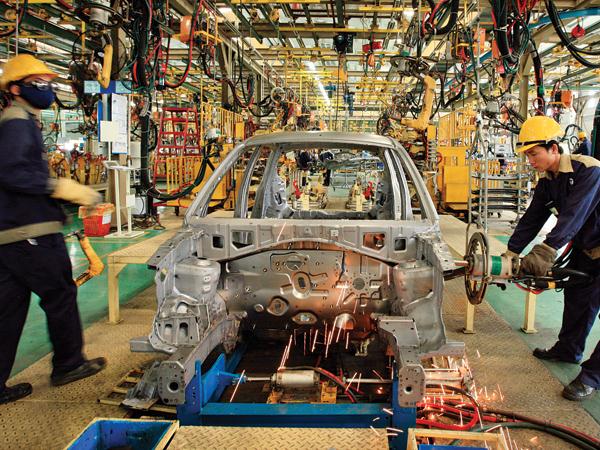Automobile and supporting industry policies tabled for development
 |
| The VBF's Automotive Working Group submitted ideas for reform |
Gaping holes in competitiveness
Vietnam's automotive market reached over 300,000 units, including 230,000 completely knocked down (CKD) and over 70,000 completely built up (CBU) vehicles in 2016 and the end of October was forecasted to decrease by 9 per cent as compared to the same period last year.
These results are hardly satisfying, seeing that it amounts to less than 50 per cent of the country’s capacity utilisation (the extent to which it uses its installed production capacity). Furthermore, the market saw much fluctuation in the past, sawing uncertainty among investors weighing long-term investments, according to the report conducted by the Vietnam Business Forum's (VBF) Automotive Working Group.
The report said that due to disadvantages of small production and economies to scale, it has been very difficult for suppliers to invest in capital-intensive production facilities, because it would result in high unit depreciation and make local parts themselves less cost competitive against imported parts.
"As a result, few suppliers can run sustainable operations in Vietnam and provide parts for automobile assemblers," it concluded.
“Without available local parts, bigger component makers and CKD vehicle assemblers need to import most materials and parts, which includes logistics and packaging costs as well as import duty. These additional expenses even widen the existing ex-factory production cost gap between Vietnamese CKD vehicles and Thai or Indonesian CBU vehicles, leading to an overall cost gap of approximately 10-20 per cent. Therefore, CKD competitiveness will be severely weakened from 2018 when import tax for ASEAN CBU is eliminated to 0 per cent,” Toru Kinoshita, leader of the Automotive Working Group, stated at the annual VBF 2017 on December 12 in Hanoi.
According to the group's report, issues on quality, cost, delivery (QCD) capability are critical for local Vietnamese suppliers. As a matter of fact, not many local suppliers meet required QCD standards to participate in global supply chains.
Despite the several decisions or decrees for supporting industry development having been issued, only a handful of suppliers can enjoy the policies due to the complicated procedures and operations.
An insufficient database of automotive parts suppliers and detailed information on their capabilities have not been compiled and updated frequently. It takes time and effort to find a company that can supply products to suppliers with different levels of QCD capabilities.
VBF’s three pillars
On the supporting industry and automotive vehicle-related policies, VBF’s Automotive Working Group drew up three pillars for a comprehensive approach. First, policies for maintaining steady, sustainable market growth, including countermeasures to minimisethe obstacles to market growth—like infrastructure development—should be at the top of the agenda and needs to play a heightened role in communications to garner public support.
Second, there need to be policies to narrow the production cost gap between local and imported parts and between CKD and CBU vehicles, ensuring fair, transparent treatment to all vehicle makers and parts suppliers while complying with the country’s international commitments.
Third, policies need to be put in place to create more convenient procedures to enhance and speed up the supplier base (via initiatives like supplier training programmes or investment incentives).
On the content of Decree No.116/2017/ND-CP on requirements for manufacturing, assembly and import of automobiles and trade in automobile warranty and maintenance services, issued on October 17, 2017, the working group identified a number of serious issues concerning the overseas vehicle type approval (VTA) requirement for CBU importers, the Conformity of Production (COP) factory certificate by overseas authorities, CBU lot-by-lot testing requirements for CBU importers, and road test requirements for automobile makers, among others.
Mai Tien Dung, Minister and Head of the Government Office, said that it is important to understand Decree 116. It regulates manufacturers and protects consumers. "The requirements for CBU importers to offer warranty and maintenance services is meant to ensure responsibility towards the consumers," he confirmed.
Regarding checking each consignment, the minister noted that it is necessary to create favourable conditions for importers and producers. If the goods in a consignment undergo no change, state management agencies will only conduct post-inspection and assessment of compliance with the law to create more favourable circumstances for importers and producers.
Dung reaffirmed that these obstacles would be reviewed to revise the decree and ensure that it suits current market realities.
What the stars mean:
★ Poor ★ ★ Promising ★★★ Good ★★★★ Very good ★★★★★ Exceptional
Latest News
More News
- US firms deepen energy engagement with Vietnam (February 05, 2026 | 17:23)
- Vietnam records solid FDI performance in January (February 05, 2026 | 17:11)
- Site clearance work launched for Dung Quat refinery upgrade (February 04, 2026 | 18:06)
- Masan High-Tech Materials reports profit: a view from Nui Phao mine (February 04, 2026 | 16:13)
- Hermes joins Long Thanh cargo terminal development (February 04, 2026 | 15:59)
- SCG enhances production and distribution in Vietnam (February 04, 2026 | 08:00)
- UNIVACCO strengthens Asia expansion with Vietnam facility (February 03, 2026 | 08:00)
- Cai Mep Ha Port project wins approval with $1.95bn investment (February 02, 2026 | 16:17)
- Repositioning Vietnam in Asia’s manufacturing race (February 02, 2026 | 16:00)
- Manufacturing growth remains solid in early 2026 (February 02, 2026 | 15:28)
















 Mobile Version
Mobile Version